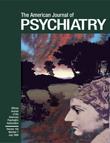Normalization of Information Processing Deficits in Schizophrenia With Clozapine
Abstract
OBJECTIVE: The authors tested the hypothesis that the use of an atypical drug, clozapine, for patients with schizophrenia is related to less impairment in information processing deficits (assessed by prepulse inhibition of the startle response) than is the use of typical antipsychotics. METHOD: Two groups of schizophrenic patients—receiving either clozapine or a range of typical antipsychotics—were tested for prepulse inhibition (a reduction in response to a startling stimulus, if preceded briefly by a weak, nonstartling stimulus; measured at prepulse-to-pulse intervals of 30 msec, 60 msec, and 120 msec) of the acoustic startle response and compared with a group of healthy volunteers. RESULTS: Patients receiving typical antipsychotics showed less prepulse inhibition with 30-msec and 60-msec prepulse trials than did comparison subjects. Clozapine-treated patients showed normal levels of prepulse inhibition. CONCLUSIONS: Clozapine is superior to typical antipsychotics in normalizing prepulse inhibition, presumably because of its pharmacological effects on prefrontal regions of the brain or its effects on a broader range of neuroreceptors.



